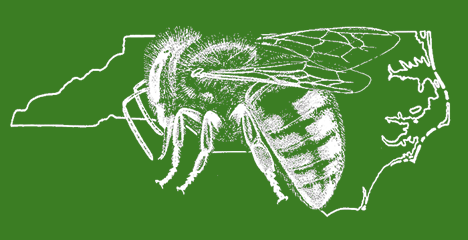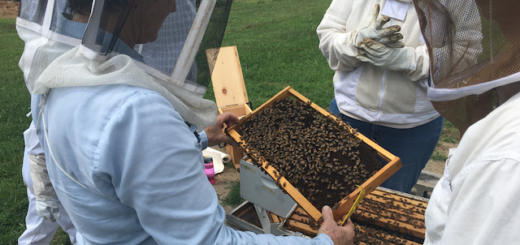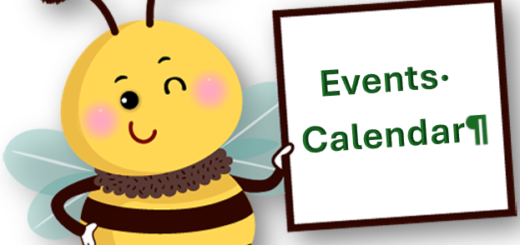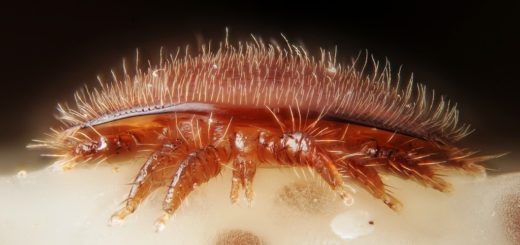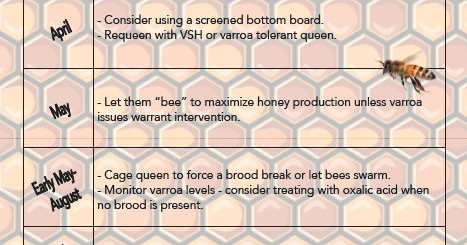Conversations with Beekeepers: Susan Carpenter
September 10, 2021
This content has been archived. It may no longer be relevant
by Billie Hinton

1. Please introduce yourself to us. This is your chance to toot your own horn, tell us the things we might not know about you, whether it’s bee-related or not!
I am Susan Carpenter, and I live with my husband Brian on six acres between Moncure and Pittsboro.
I am originally from New York. I grew up in the City and earned a Biology degree from the University of Rochester. Then I earned a Masters in Journalism (Science Communication) from Boston University before moving south in 1982. We’ve lived in North Carolina since 1991. Our two kids were born in Virginia but grew up here. We have three grandchildren. We consider ourselves fortunate that both of our kids found jobs in the Triangle and can raise families here.
I worked as a technical writer, information architect, build & automation specialist, and project manager at IBM for 25 years before going into people management. I spent another ten years leading writers, programmers, and IT operations professionals before retiring to join Red Hat as a senior manager. I’ve been at Red Hat a little over four years – long enough to experience Red Hat before its acquisition by IBM! – where I lead teams that support software-defined storage products, data services, and the needs of Red Hat business and technology partners across its portfolio.
When I’m not on the job for Red Hat or wrangling bees, I read and sing in my church choir. You might also find me on a treadmill in the basement, but I’ll return to the Pittsboro YMCA soon.
2. How long have you been keeping bees?
I’m in my second season as a beekeeper. That’s mainly because my HOA at my previous home in Cary did not permit hives. Brian and I bought land in Chatham County several years ago and finally moved out here in late 2019 after a lo-o-o-ng house building process.
I attended David Bailey’s bee school in North Raleigh in January 2020, which wrapped up in March just as things were shutting down for the pandemic. (I realize that CCBA holds classes every other year, but I wasn’t willing to wait another year. I’m most definitely not getting any younger 😉 Have you ever smelled American Foulbrood? David’s class includes a sniff – neutralized in the state’s ETO chamber, of course.
I’m also a member of the state association and have passed my written exam for Certified Beekeeper. I figure that I’ve got to get at least another season of experience – maybe more – before I go for the practical exam.
3. Tell me about what drew you to the idea of beekeeping.
As I said, I grew up a City girl. There’s something very cool about bees, doing what bees have always done, on a roof many stories above the ground. Did you know that New York City has a flourishing urban beekeeping community?
But I had enough going on working and raising kids before even considering it. It took another ten years (most of which was finding the right property) before I felt ready to go for it. I spent several years sniffing the Internet and lurking on Reddit as well.
Ironically, I don’t care much for the taste of honey. If I were to harvest anything, it would be beeswax. I already make my own soap and shampoo bars (no beeswax as yet) and would like to try my hand at lotion bars (beeswax is one of three main ingredients). I don’t ever want to keep more than two colonies, so if I’m successful, I could see selling spring splits as packages (probably not nucs) in my future.
4. Describe the day you got your first package, nuc, or full hive.
It was April 2, rainy and in the upper 40s. I’d bought a package. Who would choose to install in that kind of weather? I hiked up my big-girl pants and did it anyway. But rather than dump the package into the hive, I removed the sugar can and queen cage, placed the open package box in the hive, placed the queen cage nearby, and closed up the hive.
After 24 hours, I moved the package box (which still had a few live bees in it) to the ground in front of the hive entrance. After 48 hours, I emptied the few bees left (just about all dead).
By Day 4, the queen was not quite out of her cage. By Day 5, she was good to go. The bees had already built some comb, so between her laying and their gathering of the spring flow, the race was on to keep them building comb just a hair ahead of their needs. I offered light syrup through the end of August, caught a small flow in September, and fed heavy syrup through October and November.
Knowing how much they still had at the opening of this season, I would probably quit feeding by Halloween. I did sneak into the food stores on a warm day in February and move some food closer to the cluster midway. They made it through the winter!
5. Do you name your queens and/or colonies? If so, share the names and how you came up with them.
If I named queens, I suspect that I’d run out of names awfully fast. I’d prefer classical names like “Nefertiti,” “Agrippina,” or “Boudicca.”
After I split my overwintered colony this spring, I named the two halves Alpha (the original) and Omega (the new split). As I said, I don’t ever expect to host a Beta, a Gamma, or a Delta. Alpha is the first and Omega is the last letter of the Greek alphabet.
Alpha is on its third queen, if you count the package queen (#1). She lasted two weeks before the colony superseded her. Her immediate successor (#2) laid well through the end of last season.
Early this spring, Alpha was foraging well, but #2 didn’t come out of winter mode until mid March. Then brood laying exploded, including a healthy set of drones. When I saw swarm cells, I watched carefully until the colony started to activate some, and I split it in two.
Based on post-split behavior, I’m pretty sure that #2 wound up in Omega, but she didn’t last long. Both Alpha and Omega colonies requeened. So Alpha is on #3 and Omega is on (a different) #2. No swarms so far that I can tell. Both colonies seem to be doing well.
6. Tell me about your current hives, including hive style and apiary set-up.
This is when I ‘fess up and admit that I’m that pesky newbee asking about top bar hives. I now have two; their cross section is an upside-down trapezoid: roughly 17 inches wide at the top and narrowing at the bottom. Full-sized combs are roughly 10 inches tall, not including the bar or the comb guide, which is an upside-down chamfer cut.
I just love working with them. Installing my first package was easy-peasy: the package box fit perfectly inside the hive cavity under the top bars. The hives sit on the western edge of my back yard, facing east.
7. What is your favorite thing about keeping bees?
I can’t tell you how great it was in 2020 to escape to the bees. Bees don’t talk politics. They don’t spread COVID-19. They just are, and they work really hard. I learned a lot.
As I said, I had an early supersedure that kept brood numbers down through the first half of the season. I didn’t see my first Varroa mite in testing until September. Small hive beetles were also kept in check because the colony barely kept ahead of their energy needs, even with me feeding them. No poorly patrolled honey comb for them to hide in. They gathered in Comb #1 (the closest to the entrance) which I nicknamed Beetletown. They were easy to sweep out with a couple of pine needles and then squish.
This year, I’m already seeing beetles in the back around the food stores, though they are in the single digits. I’ve killed a few larvae. And I’ve done my first Varroa test of the season. No more New Beekeeper’s Honeymoon, but numbers were below the treatment threshold. I can wait for the weather to cool off a little before I retest and probably treat.
I’ve had to deal with some cross-combing in Omega. Brian (an electrical engineer) jokes that the engineers apparently stayed behind in Alpha, because I just don’t see that issue there. (Both hives are verified to be level.) I’m thrilled to get the experience with mitigation. And, you know, if I happen to have to cut part of a honeycomb to correct a misalignment *shrugs* things could be worse. (The bees have already repaired the comb, and the honey – light and floral – was delicious. Even I think so.)
8. How would you describe your beekeeping philosophy?
Within reason, deal on the colony’s terms. I went to the trouble of learning a little about the biology behind the ecosystem honey bees have going, so I work with it the best I know how, and I’m still learning. But honey bees are not native here, so although I interfere as little as I can get away with, I’m prepared to use Formic Pro, oxalic acid vapor, or Apivar (my nuclear option) if need be to keep the mite population down. All those requeenings and their associated brood interruptions have also helped keep mite reproduction in check, so I’ve learned not to be afraid of them.
9. Tell me your favorite beekeeping story.
When my oldest granddaughter was five, she asked if she could see my (new) bees. The hive has a glass window on its side, so we wouldn’t have to open it for her to see, but I wanted to make sure that she could move slowly and quietly around the hive. We played the Statue game until I knew that she would freeze on command if I needed her to. She did great around the bees!
10. What was your experience with bees as a child? Any memories that come to you as you think about it?
Nope. Remember, I’m a City girl. I knew what bees are, of course, but my interest came much later.
11. Is there a beekeeper or mentor who has inspired you on your beekeeping journey? Feel free to share anecdotes and/or appreciation.
I’ve been assisted and inspired by several (anonymous) folks on Reddit; they’ve been a great help and confidence builder for me. If there’s a pocket of top bar beekeepers out there in CCBA-land, I haven’t found them yet. I’d love to meet like-minded people and learn from them!
My beekeeping hero is Dr. Samuel Ramsey, now an entomologist with USDA, whose doctoral research on Varroa mite nutrition still wows me. His research revealed that mites subsist on fat body rather than hemolymph as previously thought. I have hope that this knowledge will someday help us to find more sustainable ways to manage Varroa.
Come to think of it, I will call out one other person by name: our state inspector, Nancy Ruppert. Every time I’ve asked her questions – even about top bar hives! – she’s been extremely helpful and supportive. Brava, Nancy!
12. Do you have goals for yourself as a beekeeper that you’d like to share?
I’m a sophomore beekeeper now. The word sophomore derives from the Greek, meaning wise fool. That perfectly describes where I am now. I know some but by no means enough. I need to keep learning through continuing education and gaining practical experience with keeping bees in Chatham County, North Carolina. I’m reminded all the time how local beekeeping truly is, and I appreciate the insight that CCBA members share on the mailing list.
I’m also conscious of how hard it is to find information about top bar beekeeping. I posted several articles on Reddit during my first season – triumphs as well as challenges – in the hopes that some freshman coming after me might benefit some day. I continue to seek opportunities to pay it forward. If you think there’s enough interest within CCBA to support an occasional update on top bar beekeeping, I’d be happy to contribute.
13. Any advice for a brand new beekeeper?
Bees do what their predecessors have done for eons. Learn what that is and work with it. Don’t fight it. Do what you need to do to keep yourself safe and the bees healthy, but don’t overthink it, either. The greatest gift that bees give us is that whenever that hive is open, we are forced to exist in the present – the past is behind us and the future will come soon enough. Watch and learn from your inevitable mistakes and miscues.
14. Add anything you wish I’d asked but didn’t!
Thanks for doing this!
Describe the day you got your first package, nuc, or full hive.
I was so hyped up about getting bees. I packed our 2 young kids up in the van and traveled to Mebane to pick up my first package. I stepped out of the car and promptly got stung. Not wanting to alarm the kids, I put the bees in the back of the van and took off for home. I had been initiated.
Do you name your queens and/or colonies? If so, share the names and how you came up with them.
I don’t name my queens other than Golden beauty or Black beauty. My hives are numbered to help me keep track of who is who as I may be moving them or combining.
Tell me about your current hives, including hive style and apiary set-up.
I confess that I have trouble letting a beautiful, big queen cell go to waste, so presently I am up to 16 hives. A group of us are considering starting a support group for bee hoarders. 🙂 I have 10 frame and 8 frame colonies, horizontal hives, a top bar and assorted nucs.
What is your favorite thing about keeping bees?
The bees are always teaching me something and keeping me humble.
How would you describe your beekeeping philosophy?
Over time, I have become more of a minimalist in manipulating the bees/frames. I consider myself more support staff with the understanding that the bees have the last word.
Tell me your favorite beekeeping story.
One day my husband called me out of the shop to inform me the goats were keeping the bees. I went out there to find one of the goats running from one of my hives that he had knocked over. It looked surreal, but then I realized the bees were chasing the goat and he was running for my husband. Within a couple of seconds, my husband and the goat were running but not quite fast enough. Horror turned to laughter. Fortunately, the queen was not killed, and the hive survived.
What was your experience with bees as a child? Any memories that come to you as you think about it?
No real memories come to mind.
Is there a beekeeper or mentor who has inspired you on your beekeeping journey? Feel free to share anecdotes and/or appreciation.
John Strickland and Pat Weisbrodt have been so generous with sharing their wisdom. Interestingly, each has their own style or philosophy of keeping bees which showed me you can ask 2 beekeepers a question and get different but workable answers. John and Pat have given many hours of their time to promoting beekeeping and helping aspiring beekeepers. I am in deep gratitude!
I also have a deep respect and desire to know an ounce of what Don Hopkins knows about bees. His quiet and methodical approach can only be fully appreciated by watching and talking to him.
Do you have goals for yourself as a beekeeper that you’d like to share?
I would like to see and help promote bees that are able to take care of these devil mites without the use of pesticides. Learn and practice more wild beekeeping techniques.
Any advice for a brand new beekeeper?
Beekeeping is a journey much like parenting. No 2 colonies are the same and you will never know all there is to know. Remember the bees were able to take care of themselves long before we humans showed up, so try to listen and learn what it is they need, not necessarily what we need. Ask questions and keep learning.

